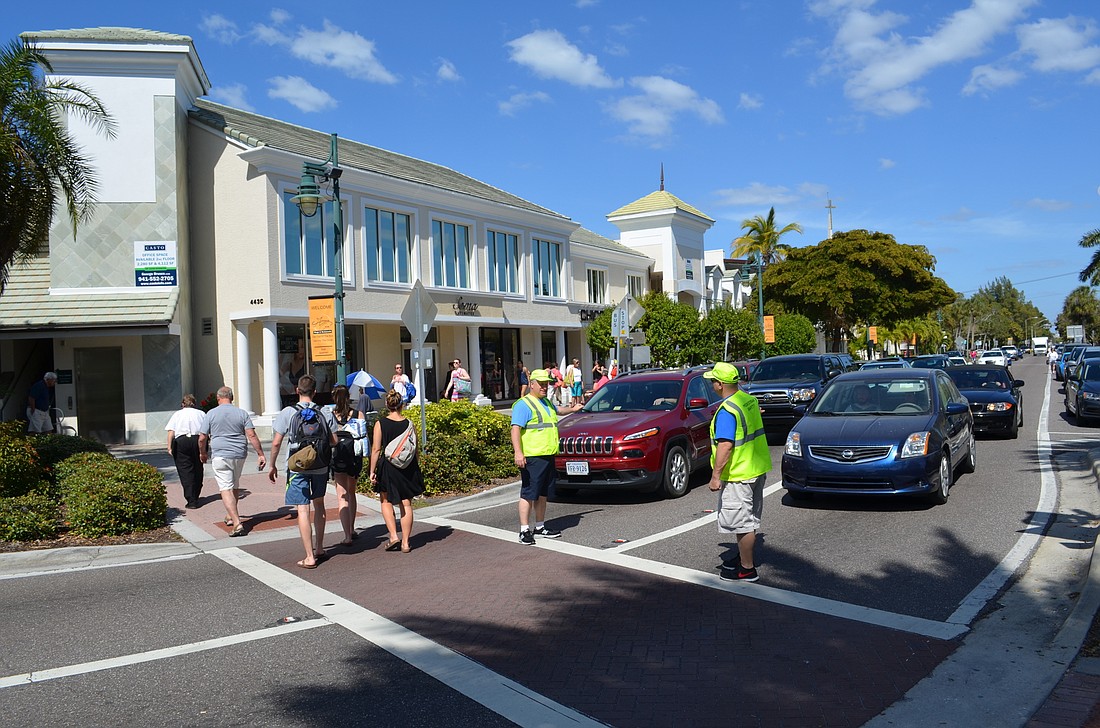- April 25, 2024
-
-
Loading

Loading

For four weeks in March and April, crossing guards helped manage the flow of pedestrians on St. Armands Circle — and key stakeholders in the area didn’t hear much positive feedback.
“I’ve heard more complaints, truthfully, than a benefit from it,” said Marty Rappaport, a member of the St. Armands Business Improvement District board of directors. “I haven’t really heard someone talk it up and say it made a big difference.”
Still, the “pedestrian managers” could be coming back. On Tuesday, the BID board of directors unanimously endorsed the pursuit of a traffic management plan that included the return of crossing guards, albeit with a revised scope of work.
The Florida Department of Transportation stationed the guards on the Circle during season this year as part of a pilot program intended to address traffic issues on St. Armands. FDOT and city officials attended Tuesday’s BID meeting to share the state agency’s findings from the trial period.
When individuals cross the street at uncontrolled intervals, cars entering or exiting the Circle are forced to sporadically and frequently stop and wait for a clear intersection. The crossing guards directed pedestrians to wait at the intersection until a larger group was assembled, creating fewer stops for motorists.
Jeffrey Trim, executive vice president of traffic consultant Sam Schwartz, said the crossing guards did yield some positive results. On average, cars stopped between 22% and 42% less frequently at Circle intersections when the guards were present. When cars did stop, the lines were longer, but Trim said the flow of traffic was generally improved.
FDOT also observed mixed reactions from people interacting with the crossing guards. Trim said some drivers stopped even when guards were instructing pedestrians not to cross the street, and those in attendance shared similar reports of confused motorists.
Diana Corrigan, executive director of the St. Armands Circle Association, said the guards were most effective at the intersections leading to mainland Sarasota and Longboat Key. Corrigan and others said speeding is more frequent on those roads, and suggested the presence of traffic workers could mitigate that problem.
The BID discussed other potential traffic-related changes on the circle, including the installation of raised sidewalks and speed radar signs to slow down traffic. FDOT officials listed some concerns about the feasibility of those options, and ultimately suggested a human solution would be most effective.
“Because of the context of the circle, there’s really nothing mechanical that can work for your peak season,” FDOT engineer Keith Slater said.
As the meeting concluded, City Engineer Alex DavisShaw suggested staff could begin investigating three different strategies for addressing the St. Armands traffic issues if there was broad community support. Those potential projects included raised sidewalks, lower speed limits and the return of crossing guards at the two key intersections in high season.
There’s currently no funding allocated for the crossing guard program, which could cost around $75,000, according to FDOT estimates. Although it’s unclear whether the guards will actually come back, St. Armands leaders said they were interested in considering any options for addressing the shopping district’s various traffic woes.
“I don’t think there’s a one-size-fits-all solution for this problem,” Corrigan said. “I think there’s going to need to be a combination of a couple of things.”